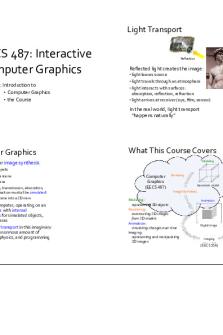CHY 1002 Sallubs - Lecture notes 1 PDF

| Title | CHY 1002 Sallubs - Lecture notes 1 |
|---|---|
| Author | Ramchandra Prajapat |
| Course | Environmental science |
| Institution | Vellore Institute of Technology |
| Pages | 2 |
| File Size | 81.2 KB |
| File Type | |
| Total Downloads | 68 |
| Total Views | 136 |
Summary
sallubs...
Description
CHY1002
Environmental Sciences
Pre-requisite
L T P J C 3 0 0 0 3 Syllabus version 1.1
Course Objectives: 1. To make students understand and appreciate the unity of life in all its forms, the implications of life style on the environment. 2. To understand the various causes for environmental degradation. 3. To understand individuals contribution in the environmental pollution. 4. To understand the impact of pollution at the global level and also in the local environment. Expected Course Outcome: Students will be able to 1. Students will recognize the environmental issues in a problem oriented interdisciplinary perspectives 2. Students will understand the key environmental issues, the science behind those problems and potential solutions. 3. Students will demonstrate the significance of biodiversity and its preservation 4. Students will identify various environmental hazards 5. Students will design various methods for the conservation of resources 6. Students will formulate action plans for sustainable alternatives that incorporate science, humanity, and social aspects 7. Students will have foundational knowledge enabling them to make sound life decisions as well as enter a career in an environmental profession or higher education. 1,2,3,4,5,9,11,12 Student Learning Outcomes (SLO): Module:1 Environment and Ecosystem
7 hours
Key environmental problems, their basic causes and sustainable solutions. IPAT equation. Ecosystem, earth – life support system and ecosystem components; Food chain, food web, Energy flow in ecosystem; Ecological succession- stages involved, Primary and secondary succession, Hydrarch, mesarch, xerarch; Nutrient, water, carbon, nitrogen, cycles; Effect of human activities on these cycles. Module:2
Biodiversity
6 hours
Importance, types, mega-biodiversity; Species interaction - Extinct, endemic, endangered and rare species; Hot-spots; GM crops- Advantages and disadvantages; Terrestrial biodiversity and Aquatic biodiversity – Significance, Threats due to natural and anthropogenic activities and Conservation methods. Module:3
Sustaining Natural Environmental Quality
Resources
and
7 hours
Environmental hazards – causes and solutions. Biological hazards – AIDS, Malaria, Chemical hazards- BPA, PCB, Phthalates, Mercury, Nuclear hazards- Risk and evaluation of hazards. Water footprint; virtual water, blue revolution. Water quality management and its conservation. Solid and hazardous waste – types and waste management methods.
Module:4
6 hours
Energy Resources
Renewable - Non renewable energy resources- Advantages and disadvantages - oil, Natural gas, Coal, Nuclear energy. Energy efficiency and renewable energy. Solar energy, Hydroelectric power, Ocean thermal energy, Wind and geothermal energy. Energy from biomass, solar- Hydrogen revolution. Module:5 Environmental Impact Assessment 6 hours Introduction to environmental impact analysis. EIA guidelines, Notification of Government of India (Environmental Protection Act – Air, water, forest and wild life). Impact assessment methodologies. Public awareness. Environmental priorities in India. Module:6
Human Population Change and Environment
6 hours
Urban environmental problems; Consumerism and waste products; Promotion of economic development – Impact of population age structure – Women and child welfare, Women empowerment. Sustaining human societies: Economics, environment, policies and education. Module:7
Global Climatic Change and Mitigation
5 hours
Climate disruption, Green house effect, Ozone layer depletion and Acid rain. Kyoto protocol, Carbon credits, Carbon sequestration methods and Montreal Protocol. Role of Information technology in environment-Case Studies. Module:8 Contemporary issues Lecture by Industry Experts
2 hours Total Lecture hours:
45 hours
Text Books 1. G. Tyler Miller and Scott E. Spoolman (2016), Environmental Science, 15th Edition, Cengage learning. 2. George Tyler Miller, Jr. and Scott Spoolman (2012), Living in the Environment – Principles, Connections and Solutions, 17th Edition, Brooks/Cole, USA. Reference Books 1. David M.Hassenzahl, Mary Catherine Hager, Linda R.Berg (2011), Visualizing Environmental Science, 4thEdition, John Wiley & Sons, USA. Mode of evaluation: Internal Assessment (CAT, Quizzes, Digital Assignments) & FAT Recommended by Board of Studies 12.08.2017 Approved by Academic Council No. 46 Date 24.08.2017...
Similar Free PDFs

1002 summary notes
- 15 Pages

CHY ref Erdöl Transport
- 3 Pages

Lecture notes, lecture 1
- 9 Pages

Lecture notes, lecture 1
- 4 Pages

Lecture-1-notes - lecture
- 1 Pages

Lecture notes- Lecture 1
- 20 Pages

Lecture notes, lecture 1
- 4 Pages

Lecture-1 - Lecture notes 1
- 6 Pages

Lecture notes, lecture 1
- 9 Pages

Chapter 8 - BUSI 1002
- 9 Pages

1 - Lecture notes 1
- 11 Pages

1 - Lecture notes 1
- 5 Pages

1 - Lecture notes 1
- 1 Pages

1 - Lecture notes 1
- 24 Pages
Popular Institutions
- Tinajero National High School - Annex
- Politeknik Caltex Riau
- Yokohama City University
- SGT University
- University of Al-Qadisiyah
- Divine Word College of Vigan
- Techniek College Rotterdam
- Universidade de Santiago
- Universiti Teknologi MARA Cawangan Johor Kampus Pasir Gudang
- Poltekkes Kemenkes Yogyakarta
- Baguio City National High School
- Colegio san marcos
- preparatoria uno
- Centro de Bachillerato Tecnológico Industrial y de Servicios No. 107
- Dalian Maritime University
- Quang Trung Secondary School
- Colegio Tecnológico en Informática
- Corporación Regional de Educación Superior
- Grupo CEDVA
- Dar Al Uloom University
- Centro de Estudios Preuniversitarios de la Universidad Nacional de Ingeniería
- 上智大学
- Aakash International School, Nuna Majara
- San Felipe Neri Catholic School
- Kang Chiao International School - New Taipei City
- Misamis Occidental National High School
- Institución Educativa Escuela Normal Juan Ladrilleros
- Kolehiyo ng Pantukan
- Batanes State College
- Instituto Continental
- Sekolah Menengah Kejuruan Kesehatan Kaltara (Tarakan)
- Colegio de La Inmaculada Concepcion - Cebu

